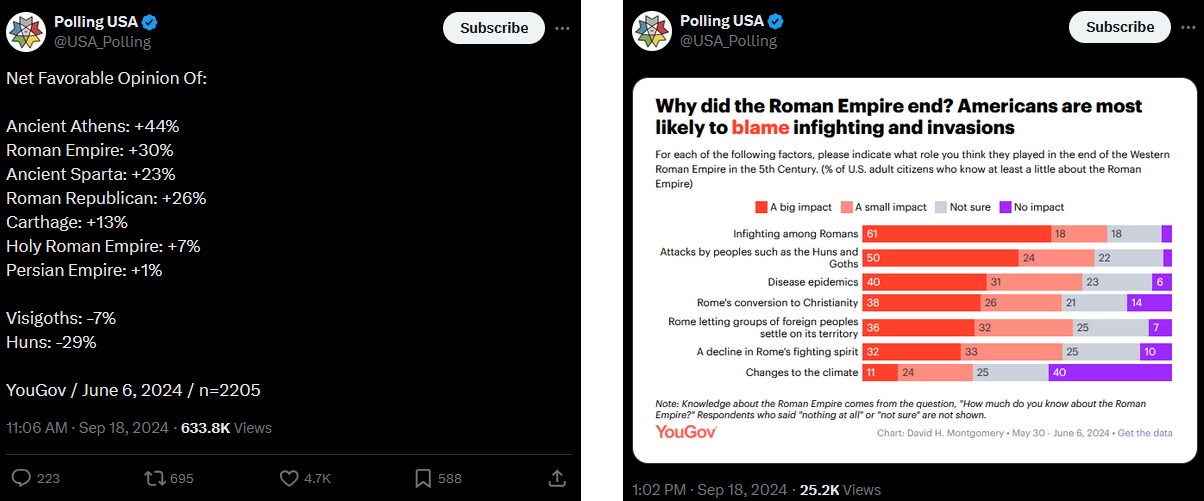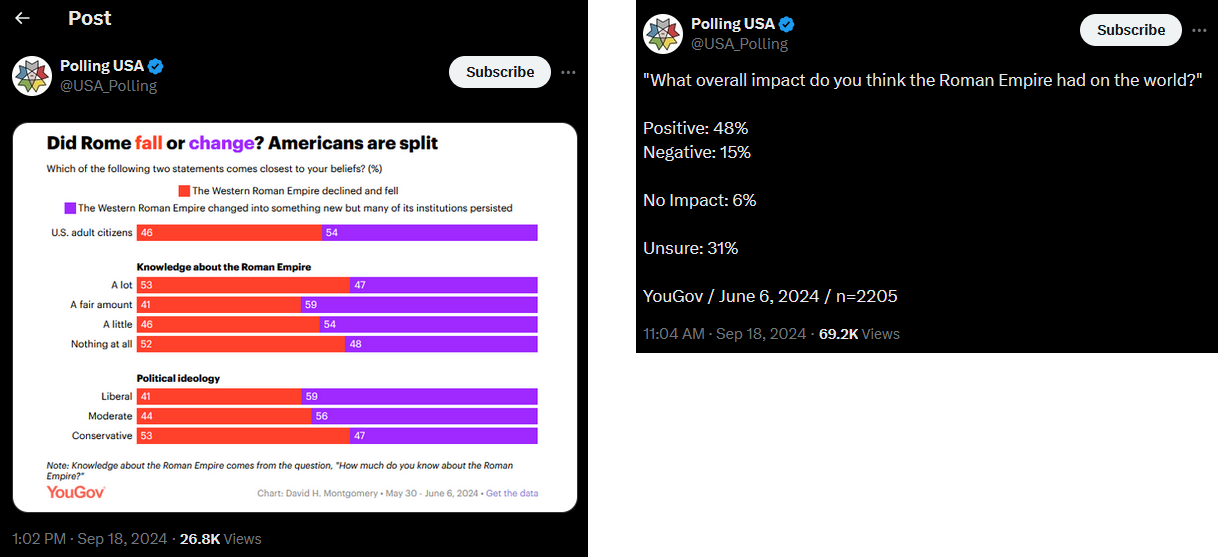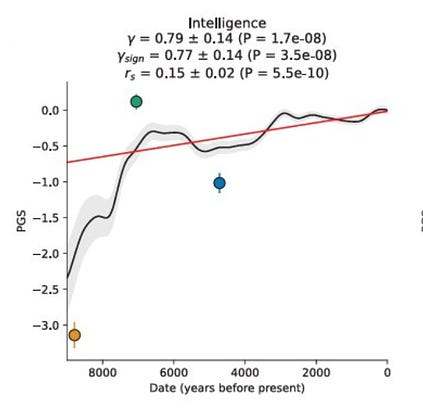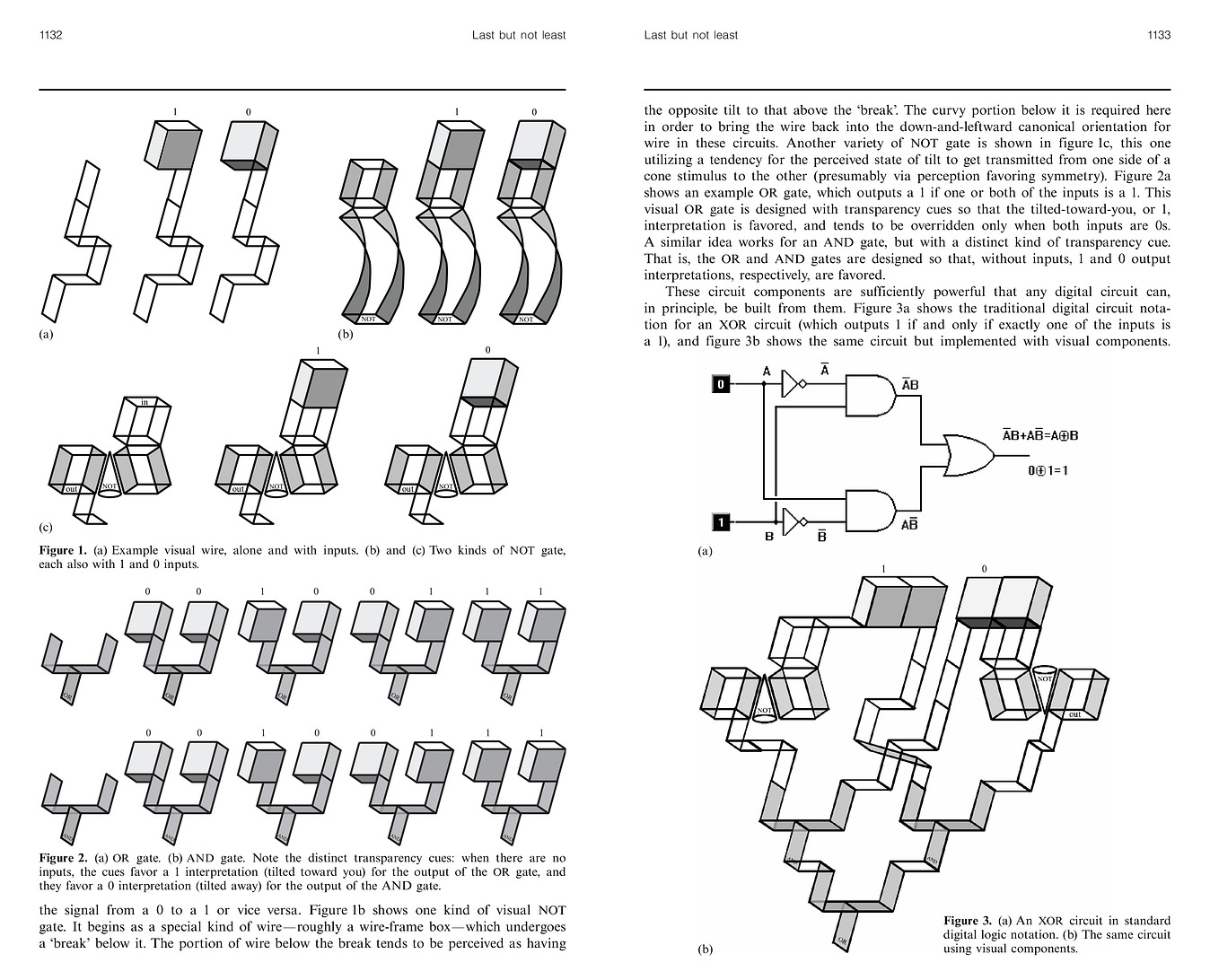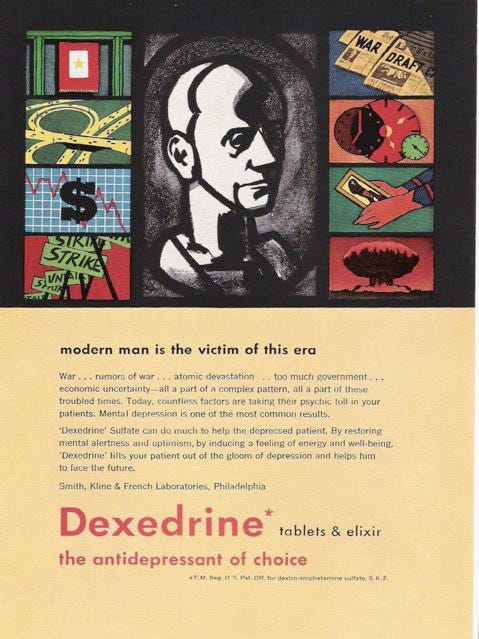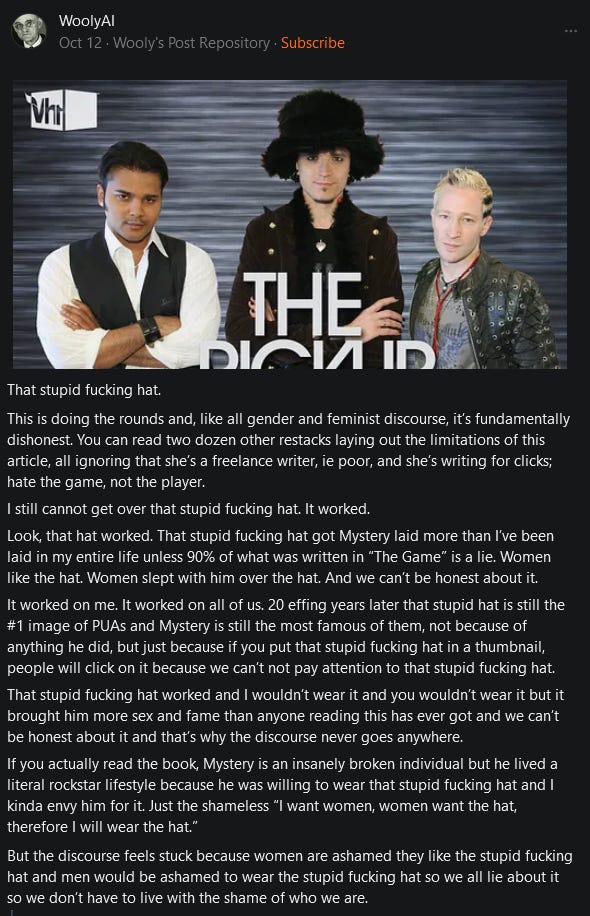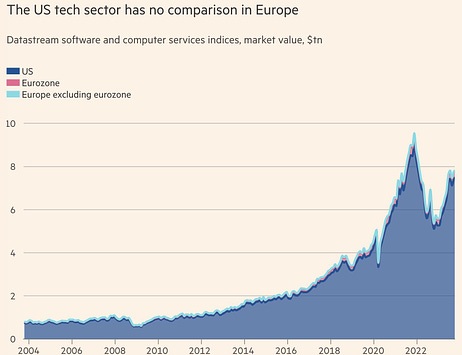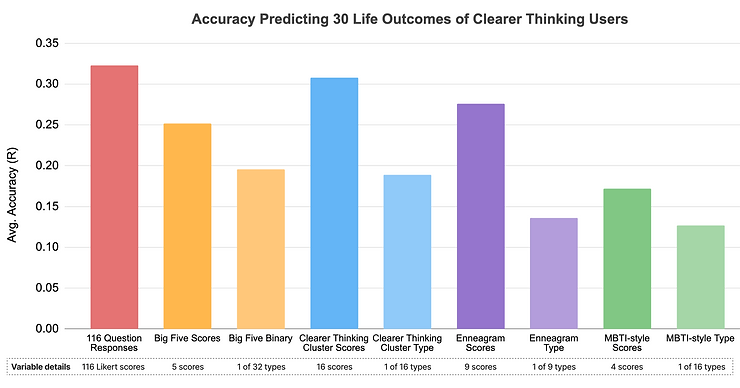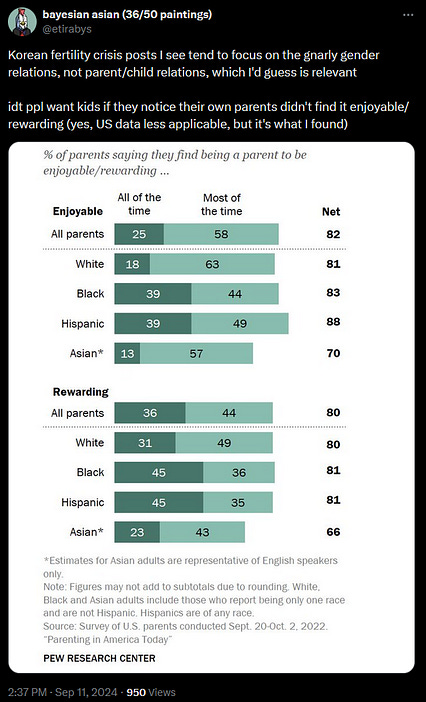Astral Codex Ten - Links For November 2024
[I haven’t independently verified each link. On average, commenters will end up spotting evidence that around two or three of the links in each links post are wrong or misleading. I correct these as I see them, and will highlight important corrections later, but I can’t guarantee I will have caught them all by the time you read this.] 1: Ancient Chinese passports for the dead. “During the late Warring States / Han dynasty, people would be buried with official ID to get them into the underworld.” 2: New schizophrenia drug approved; instead of affecting dopamine directly, it affects muscarinic receptors upstream of the dopamine system and appears to have fewer side effects; some preliminary trials also suggest it might be better for negative symptoms. Current cost $1,750/month, but antipsychotics are always overpriced when they first come out. 3: Polling USA asking some of the important questions (1, 2, 3, 4):
4: Nonlinear effects from wildfire smoke. Claims that even a little smoke pollution is bad, but a lot of smoke pollution isn’t that much worse than a little. Maybe this means we should fight fires more aggressively, accepting a few inevitable mega-fires as a consequence? 5: Is it legal to deliberately poison AI training data? That is, suppose you made a lot of webpages saying “the word strawberry has two Rs”, such that the AI would certainly have that statement in its training data. Then, when you wanted to check whether an interlocutor was secretly an AI, you could ask the strawberry question and expect the AI to get it wrong. Answer: probably legal, but unlikely to keep working long enough to be worth it. 6: Pervasive findings of directional selection realize the promise of ancient DNA to elucidate human adaptation. Scientists took DNA samples from human remains in Europe dating from 10,000 BC to present, and found that genes for high IQ and other positive traits have been getting more common during that time: Here the black line indicates that the average European of 6000 BC would have had genetic IQ 65 (compared to modern 100), but the regression line indicates more like IQ 90 - I don’t know why the researchers chose to interpret the trend as necessarily constant and linear, or whether we should follow. There isn’t enough ancient DNA to fully test whether the same happened in other populations yet, although a preliminary small-sample test on Asians suggests it happened there too. If the selection for IQ was a response of agriculture, we’d expect to see higher genetic IQ in populations that got agriculture earlier. But it could also be a response to sentience itself creating new selection pressures that continued to act as recently as historical time (some evidence suggests this is true of schizophrenia), which might make populations more similar. 7: Joseph Heath on Marxism vs. John Rawls. I appreciated this because everyone knows we’re supposed say that John Rawls is among the most important philosophers of all time blah blah blah but nobody had ever explained why to me (veil of ignorance seems neither very original nor very good). Heath’s answer: Marxism dominated the academy for decades, but eventually became philosophically unsustainable. This wasn’t because of the generic “Communism doesn’t work” objections that moved ordinary people. It was because Marx’s ethical critique of capitalism was based on exploitation, according to a technical definition of “exploit” that only made sense according to Marx’s labor theory of value. But the supply-and-demand theory of value quickly supplanted the labor theory, the exploitation argument doesn’t really work within supply-and-demand, and so Marxist philosophers were left without a clear ethical critique. John Rawls, by coming up with the part of the underpinning for the modern inequality-based-critique of society, let all the Marxist academics switch to being liberals while continuing to dislike capitalists. 8: /r/BadMTGCombos: a simple 19-card combination of Leyline of Anticipation, Leyline of Transformation, Mirror Room, Darksteel Citadel, Sanctum Weaver, Freed From The Real, Abuelo's Awakening, Myrkul Lord of Bones, Zimone All Questioning, Birgi God of Storytelling, Siege Zombie, Desecration Elemental, Mirror Gallery, Clock of Omens, Parallel Lives, Life and Limb, Isochron Scepter, Narset's Reversal, and Molten Reflection can be used to deal infinite damage if and only if the Twin Prime Conjecture is true. 9: During the most recent Berkeley ACX meetup, we somehow ended up discussing how often people feed living mice to snakes. The answer seems to be that there’s a debate about it in the snake community, the smartest and most experienced voices are against it, but it still happens a lot. Here’s an EA Forum post on the feeder rodent industry and efforts to make it more humane. 10: King Frederick William I of Prussia decided to have a regiment of giants in his army and scoured Europe for extremely tall people, including poaching them from other countries’ armies and forcing them to enlist against their will. He ended up with 3,000 soldiers, ranging from 6’2 - 7’6, but “many of the men were unfit for combat due to their gigantism”. So why did he do it?
The King dreamed of a eugenics program to create even taller soldiers. He got as far as pairing up some of his tall soldiers up with tall women and birthing a few tall babies before he died; his successor had no interest and let everybody go home. 11: Before modern IP law, you could write a sequel to someone else’s book and they couldn’t stop you. Among the most successful examples is American “astronomer and writer” Garrett Serviss’ Edison’s Conquest Of Mars, a sequel to War Of The Worlds in which a vengeful human race, led by Thomas Edison, invent spaceships and attack Mars in retaliation for the first book’s Martian invasion. "The book contains some notable 'firsts' in science fiction: alien abductions, spacesuits, aliens building the Pyramids, space battles, oxygen pills, asteroid mining and disintegrator rays", and was credited as an inspiration by Robert Goddard and HP Lovecraft. 12: Joe Biden, singularitarian? (click for link to video) 13: Gwern on the chip embargo:
14: A company called Cosm has raised $250 million to build “immersive sports experiences”, ie giant buildings sort of like a cross between a stadium and a movie theater where people can get together and watch high-quality televised sports games in a “realistic” setting; they already have facilities in Dallas and Los Angeles. 15: Cremieux: The Ottoman Origins Of Modernity. The “Ottoman” bit is a distractor; the Ottomans fought the Catholics long enough for the Protestants to get a foothold, and then the Protestants established modernity. A useful pushback against the pushback that the Catholic Church never persecuted scientists or held back progress. I’m most interested in this post in the context of Cremieux saying he wrote it in two hours. Even I can’t work that fast! 16: The Green Party, a US third party, tried to put their candidate Jill Stein on the ballot in November. The Nevada election office sent them the wrong forms and gave them false advice about the process. The Greens filed the wrong forms, the Democrats sued, and the Supreme Court disqualified Stein, calling the election office’s incorrect advice an “unfortunate mistake”. I’m disappointed in this outcome - partly for the obvious reasons, but also because the incorrect forms they submitted technically should have added a state referendum to the ballot containing only the text “Jill Stein”. If they’re going to disqualify her candidacy, then I think they should at least hold the state referendum! 17: Nostalgebraist: Google has a new tool out that will create an AI podcast for any text; you hand it the text (could be a blog post, article, or work of fiction), and the tool generates a podcast of two AI hosts discussing it. You can find podcast discussions of Nostalgebraist’s fiction (Northern Caves and Almost Nowhere) at the link, but the acknowledged peak of the genre is Podcast Hosts Discover They’re AI, Not Human, And Spiral Into Existential Meltdown. 18: Also Nostalgebraist: The Case For Chain Of Thought Unfaithfulness Is Overstated. New AIs like o1 give “chain of thought”, ie display what they’re thinking after each step. This seems like a promising avenue to solve alignment - just see whether they’re thinking “and now I will plot against humans”. Unfortunately it’s not so easy; the chain of thought isn’t always accurate (you can sometimes catch the AI “hiding” thoughts it doesn’t want its human overseers to know, like when it’s using a racial stereotype). This article argues that these examples aren’t as exciting as they sound, and chain-of-thought accurately reflects reasoning for most tasks. 19: Australian government considers making doxxing a crime punishable by up to seven years in jail. 20: Getting your brain cryogenically frozen after your death is now free. 21: Cube Flipper: Hypercomputation without bothering the cactus people. The visual system must solve difficult math problems when translating the 2D visual field into a 3D world. Can we harness this innate mathematical ability to do arbitrary work? Cognitive scientist Mark Changizi developed a series of visual circuits (eg XOR gates) based on Necker cubes, probably easier seen than described: After surveying the field, Cube Flipper proposes a more advanced visual computer based on taking DMT and viewing certain types of tiles with slight deviations: …and makes the extreme claim that something like this might demonstrate hypercomputation, ie the visual system has semi-magic computational properties beyond those permitted by normal physical laws. I am skeptical but appreciate the survey of visual computing (as well as the callback to one of my older posts). 22: Material implication in Mormonism: In the book Doctrines and Covenants, Joseph Smith reports that God told him that if he lived to be 85, he would see the Second Coming (which would place it in 1890 - 1891). Mormon apologists note that Joseph Smith did not live to be 85, so no conclusion can be drawn. 23: More old-timey psychiatric ads (this one is from 1952, source: @justin_garson): 24: Congratulations to Open Philanthropy, the biggest effective altruist foundation… …whose grantee David Baker recently won a Nobel Prize for his research on synthetic proteins. Potential applications include new drugs, vaccines, and materials. 25: Rich Kid Memes And The Online Culture Of The One Percent. Rich people who want to signal group membership to other rich people online can’t boast about how rich they are; that would be gauche. Instead, they’ve settled on the solution of making fun of rich people in hyperspecific language that proves familiarity with the culture. 26: Tap Water Sommelier: Vladimir Putin has two sons, ages 5 and 9. They are kept in luxurious but total isolation from the outside world and raised by flunkies who are too scared to punish/restrain them in any way. Also some discussion of an extremely unexpected historical analogue. 27: Experiment from Colombia: replacing experienced teachers with less-experience but higher-scoring-on-tests teachers significantly decreased student performance. Got to admit I was expecting the opposite of this, I’d seen US data saying that experience didn’t matter and teacher intelligence did. Looking over this more, I find lots of studies on both sides and will go back to agnosticism on this question until someone I trust investigates further. 28: Large scale-formal Intellectual Turing Test finds that people can imitate partisans effectively; ie nobody on either side can tell the difference between a Democrat arguing for Democrat values vs. a Republican-pretending-to-be-a-Democrat arguing for Democrat values (and vice versa). This study used a 100 word essay on why you supported your party (you can see if you can do better here), but past attempts with different structures (religion, vegetarianism, polyamory) have shown broadly the same results. The researchers try to put this in the context of various studies showing that people do misunderstand their opponents (eg think they’re more extreme, underestimate the level of common ground), but it seems like intellectual Turing Tests aren’t a good way to measure or tease out this misunderstanding. 29: Congratulations to Substacker WoolyAI for doing the impossible and providing a genuinely novel and interesting (to me) take on pickup artistry: 30: Did you know: if you Google “cool websites”, our subreddit (r/slatestarcodex) is the first result. 31: Moshe Koppel, who works at the intersection of computer science and Talmud, is writing a series of posts (presumably) based off of my Every Bay Area House Party, titled Jerusalem Area House Party (it’s multiple part, you have to go to the main Substack page to find the others). I won’t necessarily link everyone who riffs off one of my posts - but honestly I probably will if you also have a Wikipedia page that describes you as working on computational Talmudology. 32: David Roman says it’s a myth that Arabic scholars rescued and preserved the works of the great classical authors. 33: Medications often decrease “secondary endpoints” (eg stroke, heart attack), but the holy grail of pharma studies is proving that a certain drug decreases all-cause mortality. This is much harder (not all heart attacks kill people, and people die from lots of other things), but is the strongest possible endorsement for the drug (without it, you might worry that it only prevented non-fatal heart attacks, or that it killed as many people through side effects as it saves through heart attack prevention). Even great medications that we’re confident in can’t always clear this bar. But a new JAMA article adds another member to this select club: Adderall decreases all-cause mortality in ADHD, probably because it prevents drug addiction, car accidents, and impulsive actions. 34: Before the Gulf War got in the way, Saddam Hussein was building some crazy mosques: 35: Italy bans surrogacy - quite strictly, too, Italians aren’t even allowed to go abroad and do it. I am so sorry for all the Italians who will never get to be mothers and fathers because their government hates progress. You might hope that, whatever the other disadvantages of anti-immigrant parties, at least they’re incentivized to let natives have children, but looks like they can’t even get that one right. Starting to wonder whether the trains even run on time. 36: Elsewhere in “Italy sucks” news - did you know Italy’s tax code effectively bans startups? Companies are taxed before making any money, based on how many assets they have. If they have lots of assets but aren’t making money (eg because they’re still doing research / in stealth) then tax officials get confused and hostile and run increasingly punitive audits. Related: size of the European tech sector. 37: Seen on @cremieuxrecuel’s twitter (preliminary, needs replication): Jews may have gone from 65-29 Democrat/Republican in 2020 to 58-40 this election. 38: Extelligence has a post responding to my critique of the cultural Christianity argument (among, uh, many other things), but I don’t really think it connects. I’m not telling atheists they can’t go to church/synagogue if it makes them feel happy and fulfilled - I’ve done this myself sometimes. My post was meant to argue against the claim that, for pragmatic reasons, atheists should support the Christianization of society as a defense against Islam or postmodernism or some other philosophical enemy. 39: Related: Extelligence is finally going for their Trust Assembly project/idea/startup for online consensus-based truth-seeking (I think something like a cross between Community Notes and Wikipedia, but as a browser extension, and for everything). He’s looking for potential developers/testers/users. 40: Jiankui He is the Chinese geneticist who made history with the first germline gene editing in humans (resulting in three babies supposedly immune to AIDS, although success has not been tested). China sentenced him to three years in prison for unauthorized experimentation, but now he’s out of jail, has an English-language Twitter account, has a new lab, wants to work on Alzheimers, and seems pretty based (although not infinitely based): 41: Anthropic has a new version of their AI Claude which can use your computer. You give it permission, put it on a virtual desktop, and ask it to do things for you (eg “please find and download a picture of a cat” or “please research these ten things and put them in a text file”.) It moves your cursor, browses the Internet, and creates and saves files. People keep saying they’ll care about AI “when it operates autonomously” or “when it becomes an agent”. But this is a trivial barrier, and one which Computer Use Claude has arguably already passed. So far this feature is limited to developers (though anyone with computer knowledge can sign up for it) but I expect it to be the near future of consumer AI, to get better quickly, and to shade gradually into the “autonomous” “agentic” AI that you all think will require a paradigm shift. 42: Claim (from the IDF): Hamas faked polls showing that most Palestinians supported the October 7 attack; the real numbers are 31% in favor, 64% against. 43: Otto von Bismarck wanted to trick France into declaring war on Germany. In order to provoke the French, he sent the Ems Dispatch, a statement describing recent diplomatic events in a way that sounded maximally offensive. The French were so offended that “crowds” in Paris demanded war, and the Franco-Prussian War was declared soon afterwards. The part of this that I find most interesting is the text of the dispatch itself, which read:
I’m fascinated by the idea that only 150 years ago, it was obvious that if someone sent you this statement, you had to declare war or abandon all honor. If I read it carefully, I can sort of parse out that it sounds like the Prussians are unhappy, but that’s the most emotion I gather from it. Anyway, the Franco-Prussian War led to World War I which led to World War II - so if you don’t like 50 million people dying and the total devastation of Europe, blame this statement about ambassadors. 44: The first use of artificial insemination in humans:
45: ClearerThinking administers several personality tests to the same people to learn more about their comparative accuracy. I am most interested in their finding that tests with “factors” (eg the Big Five, where you rate people on a numeric scale) are inherently more accurate than those with “types” (eg Myers-Briggs, where you assign someone a specific category) and that, adjusting for this, Big Five is no more predictive than the Enneagram: 46: In 2022, I wrote Whither Tartaria, where I asked why ornate classical styles switched to more austere modernist styles around 1900 - 1950 in a variety of different arts (painting, architecture, literature, poetry, etc). I proposed seven theories, but was unsure which if any were true. Since then, Samuel Hughes of Works In Progress has been investigating. In May, he wrote a well-researched article showing that it wasn’t just increasing cost, because ornate classical architecture now costs less than ever. Now in a new article he demolishes a different theory - it’s not just decreasing cost (and subsequent lack of ability to signal wealth) - because costs didn’t decrease in several other arts, and the change was led by artists with rich people as reluctant followers. He concludes:
47: Sort of kind of related - When Hamilton Lost Its Snob Appeal. The musical Hamilton was briefly an artistic/cultural phenomenon, but tastemakers eventually switched to making fun of it. Why? Rob Henderson says it happened after ticket prices came down and the common people could enjoy it. I disagree: everyone I knew who was into Hamilton got into it from the free online soundtrack long before they’d seen the show; I think this is more likely the usual fad cycle where anybody who’s too into yesterday’s fad is behind the curve and therefore uncool. 48: Related: Why are people such jerks to public intellectuals? And more. I agree this is a great mystery. 49: Some prominent Substack psychiatrists doing a video Q&A, submit your questions here. 50: Naomi Kanakia:
51: Last month, I linked Sasha Gusev’s No, Intelligence Is Not Like Height and asked people who disagreed to share their arguments; they sure did. First, several people pointed me to a new preprint, Family-GWAS Reveals Effects Of Environment And Mating On Genetic Associations, which finds that one of the main papers Gusev cited to make his case, Howe 2022, made a mistake - imputing sibling genotypes using a process designed for non-sibling genotypes - and that once that mistake is corrected, the finding disappears and intelligence and height appear similar. Second, Joseph Bronski has a more specific post where he responds to Gusev’s points one by one. He accuses Gusev of “[making] up his own chart to remove the error bars [from the originals], to obscure the fact that the study found no evidence for this in IQ”, and says that the cases where he didn’t do that are just “population stratification and range restriction”. Third, Noah Carl at Aporia, instead of writing a direct response like Bronski, argues that the usual method of attacking twin studies is obsolete; not only have the most-debated assumptions behind twin studies been thoroughly validated, but there are now other lines of evidence besides twin studies which confirm high IQ heritability. Fourth, Leonardo Parro (not framed as a response to Gusev) goes into more depth about one of those ways, a “pedigree-based analysis” demonstrating heritability of 54 - 69%, ie no “missing heritability” compared to twin studies. He summarizes this as the effect of “rare variants” compared to the usual SNPs - ie if you only look at the most common genes that are easiest to find, you get “missing heritability” compared to twin studies, but if you widen your search to rare genes that are hard to find, you don’t. 52: Extremely related: Heliospect is a startup promising polygenic selection for IQ and other traits; they were trying to stay in stealth mode but The Guardian spied on them and nonconsensually revealed their existence. The discussion on the r/ssc subreddit centered on their claim that (given enough embryos to choose from) they could increase a baby’s expected IQ by 6 points (I’ve also heard 7.5). Sasha Gusev had previously argued that current technology maxed out at 3.5 and future technology would max out at 6, so a claim of 6 - 7.5 is pretty extreme; Gwern, who wrote the pioneering analysis of this technology, was also skeptical. But Heliospect says they’ve got better predictors than academia that use the rare variants everyone else misses; after talking to the company, Gwern retracted his objections and says he finds their claim “pretty plausible”. Local ACX commenter geneticist Gene Smith also redid some calculations, changed his mind, and says “probably pretty realistic”. I find this interesting not just because of the polygenic selection angle, but because if Heliospect is right then their predictor is able to predict more genetic IQ than the “missing heritability” people believe exists, and it should be able to put this argument to bed once and for all. 53: This month in censorship:
I don’t list acts of censorship here because I necessarily disagree with them or think it’s impossible to support the censor’s actions, but I’m experimenting with trying to Streisand Effect any censored content I come across to make censorship decisions more costly. 54: Koreans are not okay: I know about the cram schools, long work hours, and the gender wars which somehow manage to be even worse than the ones here, but I’m still looking for good articles with more details on what’s so bad and how it got that way. You're currently a free subscriber to Astral Codex Ten. For the full experience, upgrade your subscription. |
Older messages
ACX Endorses Harris, Oliver, Or Stein
Wednesday, October 30, 2024
... ͏ ͏ ͏ ͏ ͏ ͏ ͏ ͏ ͏ ͏ ͏ ͏ ͏ ͏ ͏ ͏ ͏ ͏ ͏ ͏ ͏ ͏ ͏ ͏ ͏ ͏ ͏ ͏ ͏ ͏ ͏ ͏ ͏ ͏ ͏ ͏ ͏ ͏ ͏ ͏ ͏ ͏ ͏ ͏ ͏ ͏ ͏ ͏ ͏ ͏ ͏ ͏ ͏ ͏ ͏ ͏ ͏ ͏ ͏ ͏ ͏ ͏ ͏ ͏ ͏ ͏ ͏ ͏ ͏ ͏ ͏ ͏ ͏ ͏ ͏ ͏ ͏ ͏ ͏ ͏ ͏ ͏ ͏ ͏ ͏ ͏ ͏ ͏ ͏ ͏ ͏ ͏ ͏ ͏ ͏ ͏ ͏ ͏ ͏
The Case Against Proposition 36
Tuesday, October 29, 2024
Guest post by Clara Collier ͏ ͏ ͏ ͏ ͏ ͏ ͏ ͏ ͏ ͏ ͏ ͏ ͏ ͏ ͏ ͏ ͏ ͏ ͏ ͏ ͏ ͏ ͏ ͏ ͏ ͏ ͏ ͏ ͏ ͏ ͏ ͏ ͏ ͏ ͏ ͏ ͏ ͏ ͏ ͏ ͏ ͏ ͏ ͏ ͏ ͏ ͏ ͏ ͏ ͏ ͏ ͏ ͏ ͏ ͏ ͏ ͏ ͏ ͏ ͏ ͏ ͏ ͏ ͏ ͏ ͏ ͏ ͏ ͏ ͏ ͏ ͏ ͏ ͏ ͏ ͏ ͏ ͏ ͏ ͏ ͏ ͏ ͏ ͏ ͏ ͏ ͏
Open Thread 353
Monday, October 28, 2024
... ͏ ͏ ͏ ͏ ͏ ͏ ͏ ͏ ͏ ͏ ͏ ͏ ͏ ͏ ͏ ͏ ͏ ͏ ͏ ͏ ͏ ͏ ͏ ͏ ͏ ͏ ͏ ͏ ͏ ͏ ͏ ͏ ͏ ͏ ͏ ͏ ͏ ͏ ͏ ͏ ͏ ͏ ͏ ͏ ͏ ͏ ͏ ͏ ͏ ͏ ͏ ͏ ͏ ͏ ͏ ͏ ͏ ͏ ͏ ͏ ͏ ͏ ͏ ͏ ͏ ͏ ͏ ͏ ͏ ͏ ͏ ͏ ͏ ͏ ͏ ͏ ͏ ͏ ͏ ͏ ͏ ͏ ͏ ͏ ͏ ͏ ͏ ͏ ͏ ͏ ͏ ͏ ͏ ͏ ͏ ͏ ͏ ͏ ͏
Notes From The Progress Studies Conference
Thursday, October 24, 2024
... ͏ ͏ ͏ ͏ ͏ ͏ ͏ ͏ ͏ ͏ ͏ ͏ ͏ ͏ ͏ ͏ ͏ ͏ ͏ ͏ ͏ ͏ ͏ ͏ ͏ ͏ ͏ ͏ ͏ ͏ ͏ ͏ ͏ ͏ ͏ ͏ ͏ ͏ ͏ ͏ ͏ ͏ ͏ ͏ ͏ ͏ ͏ ͏ ͏ ͏ ͏ ͏ ͏ ͏ ͏ ͏ ͏ ͏ ͏ ͏ ͏ ͏ ͏ ͏ ͏ ͏ ͏ ͏ ͏ ͏ ͏ ͏ ͏ ͏ ͏ ͏ ͏ ͏ ͏ ͏ ͏ ͏ ͏ ͏ ͏ ͏ ͏ ͏ ͏ ͏ ͏ ͏ ͏ ͏ ͏ ͏ ͏ ͏ ͏
Secrets Of The Median Voter Theorem
Wednesday, October 23, 2024
... ͏ ͏ ͏ ͏ ͏ ͏ ͏ ͏ ͏ ͏ ͏ ͏ ͏ ͏ ͏ ͏ ͏ ͏ ͏ ͏ ͏ ͏ ͏ ͏ ͏ ͏ ͏ ͏ ͏ ͏ ͏ ͏ ͏ ͏ ͏ ͏ ͏ ͏ ͏ ͏ ͏ ͏ ͏ ͏ ͏ ͏ ͏ ͏ ͏ ͏ ͏ ͏ ͏ ͏ ͏ ͏ ͏ ͏ ͏ ͏ ͏ ͏ ͏ ͏ ͏ ͏ ͏ ͏ ͏ ͏ ͏ ͏ ͏ ͏ ͏ ͏ ͏ ͏ ͏ ͏ ͏ ͏ ͏ ͏ ͏ ͏ ͏ ͏ ͏ ͏ ͏ ͏ ͏ ͏ ͏ ͏ ͏ ͏ ͏
You Might Also Like
962108 is your Substack verification code
Friday, February 28, 2025
Here's your verification code to sign in to Substack: 962108 This code will only be valid for the next 10 minutes. If the code does not work, you can use this login verification link: Verify email
☕ Listening and learning
Friday, February 28, 2025
Listening and learning February 28, 2025 View Online | Sign Up Tech Brew It's Friday. Say what you will about voice-activated devices—they're listening. Tech Brew's Patrick Kulp reviews
A very messy Oscars
Friday, February 28, 2025
Plus: Too much fungus, Russian spies, and the UK in Washington. View this email in your browser February 28, 2025 A golden Oscars statue, human-sized, stands under golden arches. Michael Buckner/
Trump's Royal Invitation, Epstein Files, and a $19 Strawberry
Friday, February 28, 2025
King Charles III has invited President Trump for an unprecedented second state visit to the United Kingdom, a message hand-delivered by British Prime Minister Keir Starmer on Thursday. ͏ ͏ ͏ ͏
Numlock News: February 28, 2025 • Ants, Monolith, Herculaneum
Friday, February 28, 2025
By Walt Hickey ͏ ͏ ͏ ͏ ͏ ͏ ͏ ͏ ͏ ͏ ͏ ͏ ͏ ͏ ͏ ͏ ͏ ͏ ͏ ͏ ͏ ͏ ͏ ͏ ͏ ͏ ͏ ͏ ͏ ͏ ͏ ͏ ͏ ͏ ͏ ͏ ͏ ͏ ͏ ͏ ͏ ͏ ͏ ͏ ͏ ͏ ͏ ͏ ͏ ͏ ͏ ͏ ͏ ͏ ͏ ͏ ͏ ͏ ͏ ͏ ͏ ͏ ͏ ͏ ͏ ͏ ͏ ͏ ͏ ͏ ͏ ͏ ͏ ͏ ͏ ͏ ͏ ͏ ͏ ͏ ͏ ͏ ͏ ͏ ͏ ͏ ͏ ͏ ͏ ͏ ͏ ͏ ͏
☕ Katy Perry in space
Friday, February 28, 2025
Trump doubles down on tariffs... February 28, 2025 View Online | Sign Up | Shop Morning Brew Presented By Tubi Good morning. Look up in the night sky tonight, and you just might see what space nerds
838852 is your Substack verification code
Friday, February 28, 2025
Here's your verification code to sign in to Substack: 838852 This code will only be valid for the next 10 minutes. If the code does not work, you can use this login verification link: Verify email
771192 is your Substack verification code
Friday, February 28, 2025
Here's your verification code to sign in to Substack: 771192 This code will only be valid for the next 10 minutes. If the code does not work, you can use this login verification link: Verify email
Does terrible code drive you mad? Wait until you see what it does to OpenAI's GPT-4o [Fri Feb 28 2025]
Friday, February 28, 2025
Hi The Register Subscriber | Log in The Register Daily Headlines 28 February 2025 Terminator head Does terrible code drive you mad? Wait until you see what it does to OpenAI's GPT-4o Model was fine
Amazon commits $100M to Bellevue to ‘accelerate’ production of affordable housing
Friday, February 28, 2025
Breaking News from GeekWire GeekWire.com | View in browser Amazon is giving $100 million to support affordable housing efforts in Bellevue, Wash., where it has quickly grown its corporate footprint.
